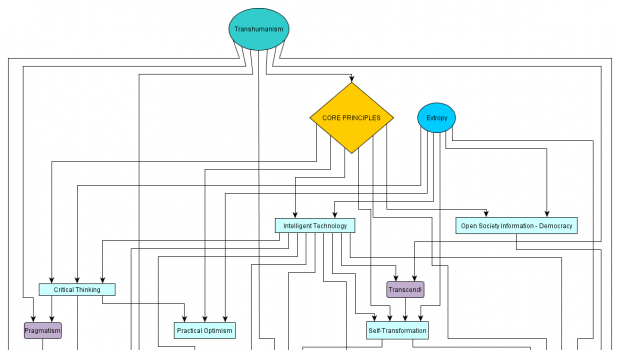Transhumanism; Nick Bostrom and David Pearce Talk to Andrés Lomeña
Transhumanismo; Nick Bostrom y David Pearce conversan con Andrés Lomeña
Andrés Lomeña
Nick Bostrom is Professor in the Faculty of Philosophy at Oxford University and founding Director of the Future of Humanity Institute and of the Programme on the Impacts of Future Technology within the Oxford Martin School, UK. He has been listed in the FP 100 Global Thinkers list, the Foreign Policy Magazine’s list of the world’s top 100 minds.
David Pearce is a British utilitarian philosopher. In 1998, he co-founded the World Transhumanist Association (WTA) with Nick Bostrom. The association, which later changed its name to Humanity+, advocates transhumanism –an ideology and movement which has emerged to support the recognition and protection of the right of citizens either to maintain or modify their own minds and bodies so as to guarantee them the freedom of choice and informed consent of using human enhancement technologies.
** *
Andrés Lomeña: Transhumanism, or human enhancement, suggests the use of new technologies to improve mental and physical abilities, discarding some aspects as stupidity, suffering and so forth. You have been described as technoutopian by critics who write on “Future hypes”. In my opinion, there is something pretty much worse than optimism: radical technopessimism, managed by Paul Virilio, the recently deceased Baudrillard and other thinkers. Why is there such a strong strain between the optimistic and pessimistic overview?
Nick Bostrom: I can’t recall any instance of me personally being labeled “technoutopian,” although certainly it’s a term that has been applied to transhumanism by some critics. In fact, there is some justice in this criticism. Transhumanism is a very diverse movement, and some individuals who call themselves transhumanists might fairly be called “technoutopian” in the sense of “uncritically accepting of the view that technology will inevitably soon solve all big problems.”
I don’t know whether technopessimism is worse or better than technoutopianism. It seems to me that we should try to overcome biases in either direction–biases towards positive as well as biases towards negative outcomes–and assign probabilities based on evidence and honest judgment rather than on the basis of ideological or temperamental prejudice.
David Pearce: Is our quality of life in technologically advanced societies better than life for our hunter-gatherer ancestors on the African savannah? The answer might seem, “Obviously, yes.” Technopessimists might reply that evidence suggesting we’re on average any happier is thin–and then go on to extrapolate accordingly. Such extrapolation is premature. We’re on the eve of a profound transformation of human nature itself. In theory, we can even recalibrate the hedonic treadmill and become constitutionally happier –relegat-ing pessimism to history. Technopessimism can sometimes be useful when it encourages deeper thought on unanticipated consequences of new technologies, worst-case scenario planning and better riskreward analysis. But if humans were all depressive realists, then we’d still be living in caves. Transhumanists believe that we can overcome our physical, intellectual, emotional (and moral?) limitations as human beings via the responsible use of technology. For what it’s worth, I’m a pessimist by temperament. But I (tentatively) believe that infotech and biotechnology will deliver billions of years of invincible well-being far richer than anything feasible today.
A.L.: There is much fear and even more ignorance. Wikipedia classifies them as follows: infeasibility, playing God argument, Fountain of Youth argument, Brave New World argument, Frankenstein argument or Terminator argument (based on Our Final Hour by Martin Rees). Which of these issues are sound (understandable) fears and which are not? One common criticism uses to be the eschatological vision of transhumanism (like Marxism and Christianity, for instance). In short, how can we struggle against these dystopian points of view?
N.B.: On a case-by-case basis, as well as by trying to identify biases that could affect our judgments across a broad range of cases. Fear is not necessarily a bad thing, provided it’s directed at something that really is dangerous, and that it results in some constructive striving to reduce the danger. For example, it makes good sense to be concerned about pandemic disease, naturally occurring as well as the possibility of bioengineered superbugs. But to fear having the option of delaying disease and senility through some effective rejuvenation therapy is perverse. In fact, I don’t think there are many people who are actually afraid of that, although some might express opposition
for ideological reasons. For an illustration of how one might attempt to diagnose and
remove a bias affecting judgment across a range of enhancement issues, see a paper on status quo bias (http://www.nickbostrom.com/ ethics/statusquo.pdf), which I wrote together with Toby Ord.
D.P.: Hubris/Playing God? What could be more “godlike” than creating new life? Not all cultures historically have made the connection between having sex and reproduction; but we have no such excuse. On the one hand, we condemn writers of computer malware who release corrupt code. Yet we freely propagate our own corrupt code across the generations–notably a lethal genetic disease (aging) and a predisposition to anxiety disorders, depression and other nasty Darwinian states of mind. As reproductive medicine advances, what’s wrong with acting as responsible parents instead? Why not plan the long-term genetic health and happiness of future generations?
Contempt for the flesh/Fountain of Youth argument? What could show more contempt for the flesh than to champion Darwinian bodies which crumble and die? As genetic medicine matures, why not design blueprints for perpetually youthful bodies? Moreover, we will soon have the opportunity to explore richer forms of sensuality; to magnify the somato-sensory cortex; and to isolate the molecular signature of sexual desire and amplify its substrates on demand. Transcending the flesh might be an option; it’s not an obligation.
Brave New World? This argument is harder to dismiss outright. But biotechnology can potentially empower the individual citizen rather than the state. For example, enhancing mood tends to increase personal autonomy and active participation in society. Conversely, low mood is associated with subordination and social withdrawal.Huxley’s soma was wrongly touted as an “ideal pleasure drug.” Truly utopian pharmacology will surpass it.
Dehumanization / the Frankenstein argument? Yes, technology can dehumanize; and biotech can create monsters. Yet biotech can also create saints and angels. Put less poetically, we will shortly be able “humanize” ourselves. For we can biologically enhance our capacity for empathy – whether by functionally amplifying our mirror neurons, or by use of pro-social designer empathogens, or by genetically engineering sustained oxytocin-release to promote social trust. Will we do so? I don’t know.
The Terminator argument? Bioterrorism and “gray goo” are perhaps the most worrying scenarios. But within the next few decades, we will most likely have self-sustaining bases on the Moon and Mars. Even on the most apocalyptic scenarios, any existential risk to intelligent life will thereby be sharply diminished. From an ethical utilitarian perspective, it’s critical that human beings survive to become posthuman. For we are the only species capable of eradicating suffering in all sentient life. We are also the only species smart enough to spread intelligent bliss throughout the accessible universe.
A.L.: Probably, the most important problem is the shortage of information. Actually, we do not know too much about Transhumanism, excepting some of Fukuyama’s articles (initially optimistic and then pessimistic). We would like to ask you about the connections between transhumanism and other topics. For instance:
Transhumanism and religion: Do you consider yourself religious? Is there an atheist or agnostic transhumanism?
N.B.: I would call myself agnostic. Most transhumanists appear to be non-religious, but there are also Catholic transhumanists, Mormon transhumanists, Buddhist transhumanists, etc.
D.P.: I think it’s hard to reconcile transhumanism and revealed religion. If we want to live in paradise, we will have to engineer itourselves. If we want eternal life, then we’ll need to rewrite our bugridden genetic code and become god-like. “May all that have life be delivered from suffering,” said Gautama Buddha. It’s a wonderful sentiment. Sadly, only hi-tech solutions can ever eradicate suffering from the living world. Compassion alone is not enough.
A.L.: Transhumanism and eugenics: Are all transhumanists eugenicist? Do you have a political program with regards to this topic? Do you consider yourself a lobby of future generations?
N.B.: The World Transhumanist Association has officially adopted a statement banning all forms of neo-Nazi eugenicists from the organization. (This was in response to an incident some years ago when one or two such trolls attempted to infiltrate the WTA.) Transhumanism supports reproductive rights among other human rights. We tend to think that it is better that reproductive decisions be in the hands of parents, in consultation with their doctor, and within broad guidelines laid down by the state. It would be ethically unacceptable, as well as potentially very dangerous, to have the state impose a one-size-fits-all formula on what kind of people should exist in the next generation.
If I were a parent, I would consider myself as having a moral duty to take all reasonable steps to ensure that the child which I was about to bring into the world would start his or her life with the best possible chances for a good life. If a pregnant woman can improve her child’s IQ by taking folic acid or choline supplements, and by avoiding alcohol, tobacco, and lead-contaminated drinking water, I believe would be irresponsible for her to fail to take these easy steps. Similarly, if I were using in vitro fertilization, and there were a simple genetic test which could select the embryo with the best genes for health and other desirable capacities, then I believe it would be negligent not to make use of the test. It would be a very small inconvenience for a potentially large gain.
D.P.: Transhumanists aren’t eugenicists in anything resembling the odious traditional sense. However, humanity is on the brink of a reproductive revolution. Prospective parents will soon be empowered to choose the kinds of children they want to bring into the world. Preimplantation diagnosis is likely to become routine. Designer genomes will follow. Most parents will aspire to have happier, smarter, healthier children. In principle, a majority of people today would probably support use of genetic medicine to prevent diseases such as cystic fibrosis. By contrast, only a minority of people currently favor “enhancement” technologies. But today’s enhancement technologies are tomorrow’s remedial therapies. By the standards of our successors, mortal humans will presumably all seem tragically diseased and dysfunctional. At present we think it’s morally acceptable to pass on to our children the lethal hereditary disease of aging –and a predisposition to various ugly states of mind (e.g. jealousy, low mood, anxiety, resentment, and loneliness) adaptive in the ancestral environment. Yet human life could potentially be so much richer. As technology matures, why not replace the cruel genetic roulette of natural selection…?
Nick Bostrom es profesor en la Facultad de Filosofía de la Universidad de Oxford y director fundador del Future of Humanity Institute y del Programme on the Impacts of Future Technology de la Oxford Martin School, Reino Unido. Ha sido incluido entre los 100 pensadores Globales más importantes, según una lista elaborada por la revista Foreign Policy.
David Pearce es un filósofo utilitarista británico. En 1998 fundó junto con Nick Bostrom la World Transhumanist Association (WTA). Organización que más tarde cambió su nombre por el de Humanity+ y que divulga el transhumanismo, movimiento en favor del reconocimiento y protección del derecho de los ciudadanos a mantener o modificar sus propias mentes y cuerpos (garantizando la libertad de elección y el consentimiento informado) mediante el uso de tecnologías para la optimización humana.
** *
Andrés Lomeña: El transhumanismo u optimización humana sugiere el uso de nuevas tecnologías para incrementar la capacidad cerebral y física, descartando aspectos como la debilidad mental y el sufrimiento. El proyecto ha sido calificado de tecnoutópico por críticos que lo describen como una de las “hipérboles del futuro”. Sin embargo, en mi opinión hay algo mucho peor que este optimismo: el tecnopesimismo radical, dirigido por Paul Virilio y el recientemente fallecido Baudrillard, entre otros. ¿Por qué existe una intensa pugna entre las conclusiones optimista y pesimista?
Nick Bostrom: No recuerdo haber sido etiquetado como “tecnoutópico”, aunque seguramente es un término usado por algunos críticos. De hecho, hay cierta justicia en esa acusación. El transhumanismo es un movimiento muy diverso y algunos que se hacen llamar transhumanistas podrían muy bien ser tildados de “tecnoutópicos” en el sentido de “aceptar acríticamente el punto de vista de que la tecnología resolverá pronto e inevitablemente todos nuestros grandes problemas”. No sé si el tecnopesimismo es peor o mejor que el tecnoutopismo. Pero me parece que deberíamos intentar superar nuestros prejuicios en cualquier dirección y probar sólo las probabilidades basadas en evidencias y juicios honestos y no con base en obcecaciones ideológicas o temperamentales.
David Pearce: ¿Es nuestra calidad de vida en las sociedades avanzadas tecnológicamente mejor que la de nuestros antepasados cazadores y recolectores de la sabana africana? Obviamente, la respuesta podría ser que sí. Por su parte, los tecnopesimistas podrían responder que, en promedio, la evidencia que sugiere que somos más felices es mínima, extrapolando luego todas las consecuencias de tal deducción. Pero aquí toda extrapolación es prematura. Nos encontramos en vísperas de una profunda transformación de la naturaleza humana. En teoría, podemos calibrar incluso nuestro promedio de bienestar [hedonic treadmill] y llegar a ser constitucionalmente felices, relegando a la historia el pesimismo. El tecnopesimismo puede ser útil cuando alienta un pensamiento riguroso acerca de las consecuencias imprevisibles de las nuevas tecnologías, proyectando el peor de los escenarios y, en este sentido, en favor de un análisis a fondo de los riesgo y beneficios. Pero si los seres humanos fueran todos realista-depresivos, aún estaríamos viviendo en las cavernas. Ciertamente, los transhumanistas consideran que podemos superar nuestras limitaciones físicas, intelectuales, emocionales (¿y morales?) mediante el uso responsable de la tecnología. En las cosas importantes soy pesimista por temperamento. Pero (en principio) creo que las tecnologías informáticas lo mismo que la biotecnología podrían ofrecer muchísimos años de insuperable bienestar en mayor medida que cualquier otra de las alternativas factibles hoy en día.
A.L.: Hay muchos miedos y mayor ignorancia. Wikipedia ha sistematizado todos esos temores bajo los siguientes argumentos: infactibilidad, jugueteo con la idea de Dios, Fuente de la Juventud, un Mundo Feliz, Frankenstein o Terminator (basado en Our final hour, de Martin Rees). ¿Qué de estas publicaciones son miedos razonables y cuáles no? Una crítica común es la visión escatológica del transhumanismo parecida a la del marxismo y el cristianismo, por ejemplo. ¿Cómo podemos responder a esas opiniones?
N.B.: Partiendo de una base caso por caso, así como tratando de identificar las influencias externas que pudieran afectar nuestros juicios en una amplia gama de ejemplos. El miedo no es necesariamente malo, siempre y cuando esté enfocado sobre algo realmente peligroso y que, al cabo, redunde en un esfuerzo constructivo para someter cualquier riesgo. Por ejemplo, tiene sentido preocuparse por las pandemias de origen natural así como las producidas por potenciales súper bacterias salidas de la bioingeniería. Pero experimentar miedo ante la opción de retardar las enfermedades y la senilidad gracias a algunas terapias de rejuvenecimiento eficaces, es perverso. De hecho, no creo que existan muchas personas realmente con miedo, si bien algunos podrían expresar su oposición por razones ideológicas. Para dar un ejemplo de cómo se podría tratar de localizar y corregir ciertos prejuicios en torno a una serie de posibles optimizaciones, recomiendo consultar el documento que escribí junto con Toby Ord: “The Reversal Test: Eliminating Status Quo Bias in Applied Ethics” (http:// www.nickbostrom.com/ethics/statusquo.pdf).
DP: Jugar con la idea de Dios. Se trata del pecado de hibris: arrogancia desmesurada. ¿Pero qué puede ser más arrogante y “divino” que crear nueva vida? Históricamente, no todas las culturas han hecho la conexión entre relaciones sexuales y reproducción, pero nosotros no tenemos esa coartada. Por un lado, condenamos a los programadores de malware informático que liberan código corrupto en las redes. Sin embargo, nosotros mismos propagamos nuestro código corrupto a otras generaciones –particularmente, esa enfermedad genética letal, el envejecimiento; o las predisposiciones a los trastornos de ansiedad y depresión junto con otros estados de ánimos ofensivamente darwinianos. A medida que avanza la medicina reproductiva, ¿qué hay de malo en actuar como padres responsables? ¿Por qué no planear a largo plazo la salud genética y la calidad de vida de las generaciones futuras?
Desprecio de la carne / ¿Fuente de la Eterna Juventud? ¿Pero qué puede mostrar mayor desprecio por la carne que abogar por esos cuerpos que se desmoronan y mueren? En la medida en que la medicina genética se consolide, ¿por qué no planear un modelo preliminar de constituciones eternamente jóvenes? Por otra parte, pronto tendremos la oportunidad de explorar formas más ricas de sensualidad, ampliar la corteza somato-sensorial y aislar la rúbrica molecular del deseo sexual amplificándolo a voluntad. La trascendencia de la carne podría ser una opción…, no una obligación.
¿Un mundo feliz? Este argumento es más difícil de descartar. Aunque la biotecnología puede reafirmar al ciudadano y no al Estado. Por ejemplo, mejorando las iniciativas en favor de una mayor autonomía personal y de participación activa en la sociedad. Por el contrario, un estado de ánimo depresivo se asocia con la subordinación y el aislamiento social. El soma de Huxley fue erróneamente considerado una “droga de placer ideal”. La farmacología utópica será superada.
Deshumanización / Frankenstein. Sí, la tecnología puede deshumanizar y la biotecnología crear monstruos. Aunque también podría crear santos y ángeles. Digámoslo de manera menos poética: dentro de poco será capaz de “humanizarnos” para que, biológicamente, mejoremos nuestras capacidades de empatía… Sea por la amplificación funcional de nuestras neuronas espejo, mediante empatógenos de diseño pro-sociales o gracias a la ingeniería genética que liberaría oxitocina ambiente y continua para propiciar nuestra confianza social ¿Lo haremos? No lo sé.
Terminator. El bioterrorismo y la “plaga gris” [grey goo: colapso global mediante “plagas” de nanotecnología] son quizá los escenarios más preocupantes. No obstante, en las próximas décadas contaremos con mayores posibilidades de establecer bases autosustentables en la Luna y Marte. Incluso en los escenarios más apocalípticos, el riesgo existencial para la vida inteligente se verá marcadamente disminuido. Desde una perspectiva ética utilitaria, es fundamental que los seres humanos sobrevivan para convirtirse en “post-humanos”. Somos la única especie capaz de erradicar el sufrimiento de toda vida sensible. Asimismo, la única especie inteligente como para propagar tal inteligencia en ese universo que nos sea accesible.
AL:. Probablemente, el problema más importante es la escasez de información. En realidad, no sabemos demasiado acerca de transhumanismo, con excepción de algunos artículos de Fukuyama (inicialmente optimista y después pesimista). Me gustaría hacer conexiones entre el transhumanismo y otros temas, por ejemplo, el transhumanismo y la religión. ¿Se consideran religiosos? ¿Hay transhumanismo ateo o agnóstico?
NB: Me gustaría decir que soy agnóstico. La mayoría de los transhumanistas parecen ser no religiosos, aunque hay transhumanistas católicos, mormones, budistas, etc.
DP: Creo que es difícil conciliar el transhumanismo con la religión revelada. Si queremos vivir en el paraíso, vamos a tener que crearlo nosotros mismos; si deseamos una vida eterna, entonces tendremos que reescribir nuestra código genético plagado de errores y llegar a ser… celestiales. “Que lo que tiene vida sea libre de sufrir”, dijo el Buda. Un sentimiento maravilloso. Lamentablemente, únicamente las soluciones de alta tecnología podrán alguna vez erradicar el sufrimiento de los seres vivos. La compasión por sí sola no es suficiente.
AL: Transhumanismo y eugenesia. ¿Son todos los transhumanistas partidarios de ésta? ¿Tienen un programa político al respecto? ¿Se consideran ustedes un lobby de las generaciones futuras?
NB:. La Asociación Mundial Transhumanista ha expresado oficialmente su rechazo de todas las formas de eugenesia neo-nazi. Esto fue en respuesta a un incidente ocurrido hace algunos años, cuan do ciertos trolls intentaron infiltrarse en la WTA. El transhumanismo defiende los derechos reproductivos, entre otros derechos humanos. Creemos que lo mejor, a este respecto, es que las decisiones reproductivas estén en manos de los padres, con base en las consultas con su médico y dentro de las directrices generales establecidas por el Estado. Sería éticamente inaceptable y potencialmente muy peligroso que cualquier Estado imponga fórmulas unitalla para la gente en las próximas generaciones.
Si yo fuera padre, tendría la obligación moral de tomar todas las medidas razonables para asegurarme de que el niño que estuviera a punto de traer al mundo empezara su vida con las mejores oportunidades. Si una mujer embarazada puede mejorar el coeficiente intelectual de su hijo tomando ácido fólico o suplementos de bilineurina y evitando, asimismo, el alcohol, tabaco o cualquier tipo de agua contaminada, creo que sería irresponsable para ella dejar al margen estas simples precauciones. Del mismo modo, si recurrió a la fecundación in vitro y gracias a una simple prueba genética podría seleccionar un embrión genéticamente saludable, entre otras capacidades deseables, creo que sería imprudente no hacer uso de esa prueba. Una pequeña tarea para una ganancia muy importante.
DP: Los transhumanistas no son nada semejantes a los tradicionalmente odiosos eugenisistas. Como quiera, la humanidad se encuentra al borde de una revolución en materia reproductiva. Muy pronto, los padres tendrán la posibilidad de elegir el tipo de hijos que desean traer al mundo. Probablemente, el examen genético preimplantacional [utilizado para identificar problemas genéticos en los embriones creados mediante fecundación in vitro] pronto se convertirá en rutina. Le seguirán los genomas de diseño. La mayoría de los padres aspiran a tener hijos más felices, sanos e inteligentes. Por principio, la mayoría apoyaría hoy el uso de medicina genética para prevenir enfermedades como la fibrosis quística. Por el contrario, sólo una minoría favorece las “mejoras” de origen tecnológico. Sin embargo, las tecnologías de optimización de hoy serán las terapias del mañana. Para los estándares de nuestros sucesores por venir, los humanos de hoy morimos trágicamente enfermos y disfuncionales. Actualmente, creemos que es moralmente aceptable transmitir a nuestros hijos la herencia letal del envejecimiento –junto con una predisposición a varios estados de ánimo feos (celos, depresión, ansiedad, rencor y soledad, por ejemplo) resultado del entorno hereditario. Sin embargo, la vida humana podría ser mucho más rica. En la medida en que la tecnología evolucione. ¿por qué no reemplazar la cruel ruleta genética de la selección natural…?










